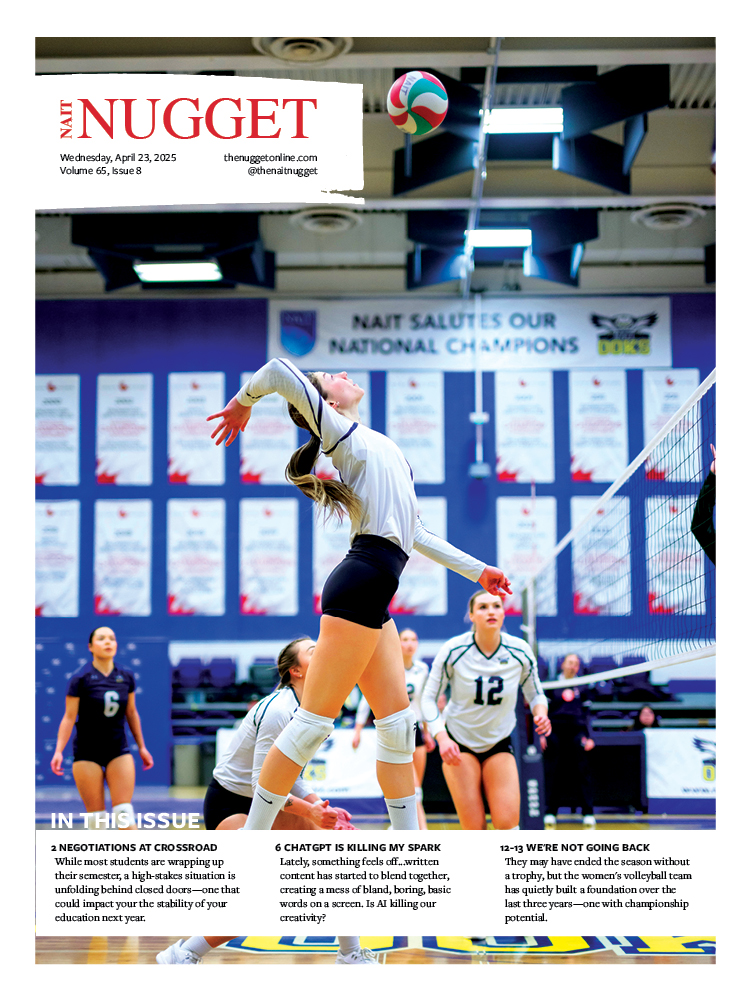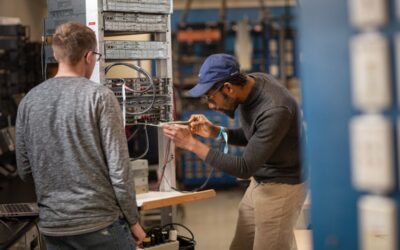By Jory Proft
The M.A.N. Program is in full-swing, but not all of the NAIT community believes a men’s group is the way to deal with masculinity and sexual violence.
“I don’t think this is a men’s or women’s issue. This stuff is 100% all of our [society’s] problem. I don’t think it’s just up to men to fix these problems — I think they’re the lightning rods for it though,” said Tanya Spencer of NAIT Student Counselling.
Spencer has a Master’s degree in Men’s Studies and thinks these topics cannot always be solved by just a discussion amongst men.
M.A.N.’s eight-week program is about halfway through its pilot run and aims to educate men at NAIT on sexual violence and masculinity. The current group strictly consists of male staff, but will only involve students in the January sessions.
Tim Ira, Student Programs Coordinator and facilitator of the sessions stated that M.A.N. is part of NAIT’s initiative towards building a culture of consent. Ira believes that the program is an important tool for sexual violence prevention and education.
“Sexual violence is always underreported. The reports that we [NAIT] do get probably don’t account for the vast majority of what might be happening on campus,” said Ira. “It takes building that culture of consent for us to be able to engage in that prevention work. The M.A.N. Program is part of that process.”
While Spencer believes consent education is important, she thinks society focusing so much of the issue on men has become a problem.
“The rhetoric surrounding sexual assault is heavily-oriented towards women as survivors and men as aggressors. When you look at it, about 90% of aggressors are men, so I see where people are coming from,” said Spencer. “But what I don’t think has received enough airplay is just because you have this small number of guys who are causing a lot of fuss, doesn’t mean all guys are untrustworthy and as a woman I’m unsafe everyone I go…. The fact that a group about masculinity is turning into how to not rape people — I think that’s a little unfortunate.”
Along with her belief that sexual violence prevention is heavily aimed at men, Spencer says negative traits of gender, such as toxic masculinity, is not exclusive to males and its prominence has been slightly exaggerated.
“Some people think masculinity is like a club and guys get together and set the rules and police everything. But, I’ve seen women be just as rabid about it, if not more than the guys. I’ve seen women criticize these efforts [to explore traditional masculinity] more than men,” said Spencer. “Toxic masculinity is something that a minority [of men] practice. A good portion of society believes it’s more common than it probably is and a good portion of society imposes [this] on men.”
And with most mental health groups, Spencer believes the people that could use these types of groups the most will never go and are the least likely to access it.
“I think that [sentiment] will always hold true…. I think it [the M.A.N. program] will initially attract people that may not need that kind of help. [But] I think they’ll benefit either way.”
Tim Ira recognizes the potential for an “echo chamber” effect on the group, meaning a situation in which beliefs are amplified or reinforced by communication and repetition inside a closed system. Despite this, he believes the members of M.A.N. are currently diverse enough. He said members range from men who are well-versed in masculinity issues, to men he would describe as hyper-masculine, to men who had zero exposure to these topics.
“It’s a mixed-bag group — which is exactly what it should be. Even within an [echo chamber] room of well-meaning men, there’s still a lot of learning that can happen.” said Ira. “I think reaching out to men who might not be part of that choir is important.”
NAIT is currently exploring methods that get to as many students as possible, such as the NAIT Portal and promoting the program through instructors.
While Spencer and Ira have differing views on the some of the program’s main focal points, they both expressed their beliefs that devoting a space for men to openly discuss masculine issues is important. The parties also agree on the relevance of discussing and breaking-down gender stereotypes at NAIT.
“We’ve pretty much figured out as a society that women are not their stereotypes, but I don’t think we’ve quite got there with men,” said Spencer. “I’d love to see a day when someone says ‘men’s group’ and you have no idea what they’d be talking about in the sense of what would the specific topic be.”






